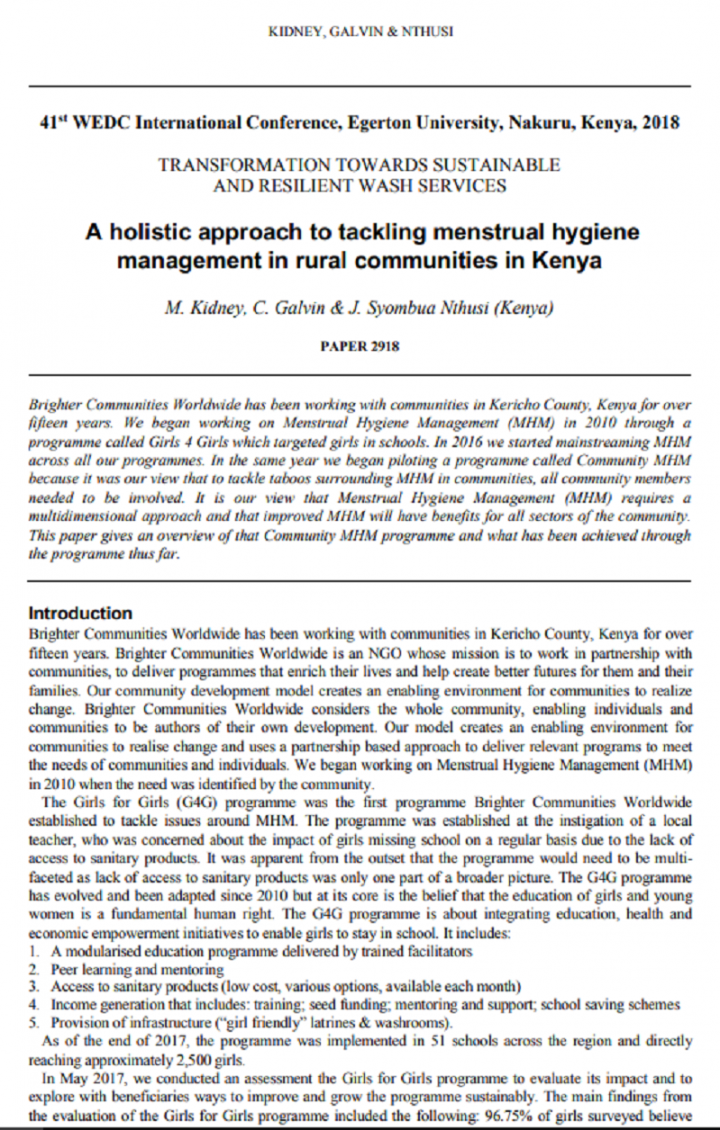
Published in: 2018
Publisher:
WEDC Conference in Nakuru, Kenya
Author:
Various Authors
Uploaded by:
Elisabeth von Muench
Partner profile:
common upload
1317 Views
0 Downloads
WEDC conference papers are an important source for learning about WASH innovations and lessons learned in the field and more than 150 papers were accepted for the 2018 WEDC conference.
Below are titles of the Emergency WASH papers (for the link see below):
- Designing evidence-based and context-specific hygiene programs in emergencies: could there be an app for that?
- Shedding light on humanitarian sanitation
- Surface water management in humanitarian crises
- Using pre-crisis market analysis to strengthen emergency preparedness and resilience of WASH systems
- Systematic improvements in humanitarian WASH services: Ugandan Refugee settlements -
- Public private partnerships (PPP) in emergencies: the case of Dollow water management company, Gedo region
- Rapid response to efficiently counter cholera: lessons from a 45-days intervention in Eastern DRC
- Household water filters and waterborne epidemics: a case study from South Sudan
- Addressing challenges of water resilience: a study of water security risk in pastoralist households in Kenya
- Continuous safe water monitoring using 3G telemetry in IDP camp water supply systems: Iraq trial
- Lessons learned from fifteen drinking water treatment program evaluations in Haiti
Short summaries:
Designing evidence-based and context-specific hygiene programs in emergencies: could there be an app for that? – This research explored the factors that determine hygiene behaviour in emergencies and the barriers that prevent humanitarian actors from improving hygiene program design. Humanitarian actors felt that hygiene behaviour change was the remit of experts and that current guides are overly generic and hard to adapt and apply. The findings from this research are being used to develop a software-based tool to aid practitioners in designing rapid, evidence-based and context-specific programs in emergencies.
Shedding light on humanitarian sanitation – A three-country research project looking at the impact of lighting on WASH use and GenderBased Violence (GBV) required a multi-disciplinary approach, combining OXFAM’s practical implementing expertise with WEDC’s research-orientated approach. The research showed how much more is needed for safe sanitation than just building latrines.
Surface water management in humanitarian crises – This paper reports on the scoping stage of a practical toolkit being developed to support the application of surface water management practices in humanitarian contexts. The toolkit is predominately aimed at refugee and IDP camps for displaced people and aims to address the lack of suitable guidance in this area.
Using pre-crisis market analysis to strengthen emergency preparedness and resilience of WASH systems – This paper describes Oxfam’s experiences using pre-crisis market analysis in Bangladesh, Indonesia, South Sudan and Zimbabwe in order to support market-based programming to strengthen the resilience of market systems and prepare for reoccurring emergencies.
Systematic improvements in humanitarian WASH services: Ugandan Refugee settlements – World Vison Uganda systematically implemented a three-one year inclusive WASH project in refugee settlements in Uganda to improve access for people with disabilities. The project involved engagement of key stakeholders to identify and discuss challenges
Public private partnerships (PPP) in emergencies: the case of Dollow water management company, Gedo region – This paper presents the success of the Public Private Partnership Model in the management of water supplies in Dollow town, Gedo region of Somalia. The PPP approach in provision of water has succeeded in providing a stable and sustainable water supply system for the town.
Rapid response to efficiently counter cholera: lessons from a 45-days intervention in Eastern DRC – SOLIDARITÉS INTERNATIONAL intervened in two health zones in North Kivu, two highly underfunded and forgotten affected areas. Thanks to the rapid reactivity and flexibility of the response, the epidemic curve of cholera cases was rapidly controlled. Several lessons from this intervention are worth highlighting and sharing.
Household water filters and waterborne epidemics: a case study from South Sudan – Even if further specific research is needed, it looks clear that the analysis of historical epidemics of waterborne diseases in the area of intervention, together with considerations about the general context and technical characteristics of the available treatment devices, can help to identify the best water treatment solutions.
Addressing challenges of water resilience: a study of water security risk in pastoralist households in Kenya – Pastoralist communities in Northern Kenya face increasing water security risks attributable to disruptions in their hydro-climatic and socio-ecological environments. Sedentary pastoralists, women and children are most vulnerable to spatial-temporal variations in water availability.
Continuous safe water monitoring using 3G telemetry in IDP camp water supply systems: Iraq trial – The Chloroclam, a small high-resolution chlorine analyser that transmits continuous real-time data through a 2G/3G mobile network, was trialled over a 7-month period in an IDP camp in Northern Iraq to determine its functionality and ease of use in a crisis context. The results validated the data produced by the Chloroclam, with datasets highlighting significant seasonal and diurnal variances in chlorine concentrations and noting that manual sampling was not representative of the functionality of the water supply system.
Lessons learned from fifteen drinking water treatment program evaluations in Haiti – The 2010 earthquake in Haiti and subsequent cholera outbreak thus led to the implementation of numerous point-of-collection (PoC) and point-of-use (PoU) water treatment programs. We propose to present a synthesis of lessons learned from fifteen evaluations conducted in Haiti between 2010 and 2016, including four PoC and eleven PoU water treatment programs.
Bibliographic information
Various Authors (2018). Emergency WASH papers from the 2018 WEDC Conference. WEDC Conference in Nakuru, Kenya
Filter tags
Camps (emergency or longer term) English Practitioners















